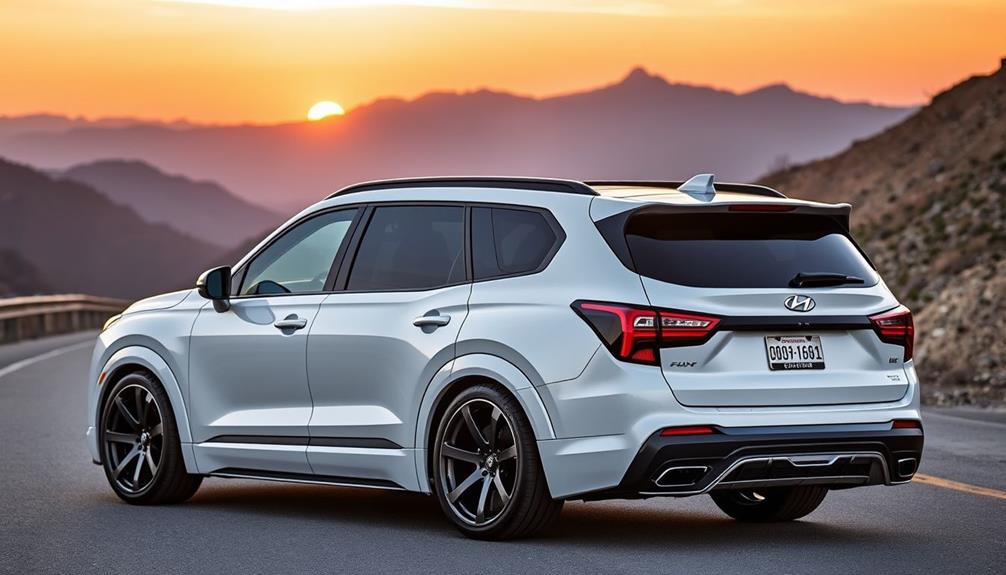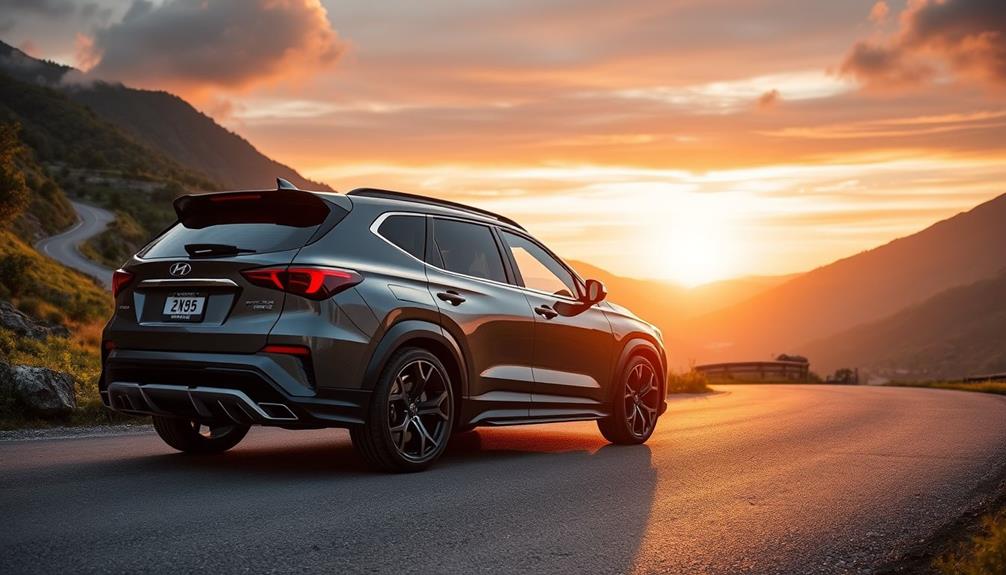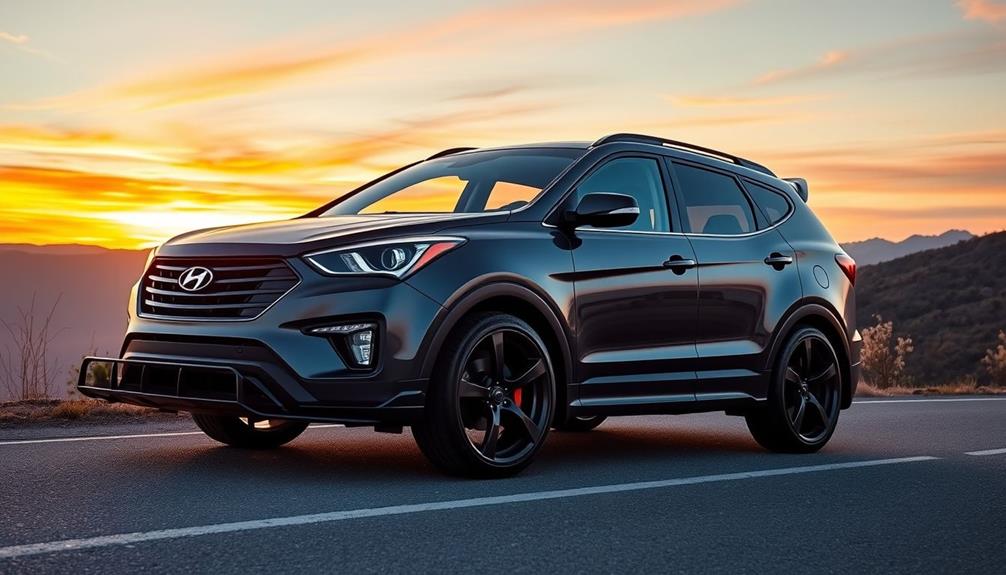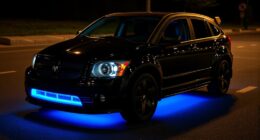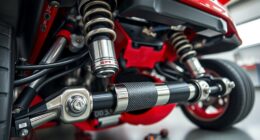Tuning your 2006 Hyundai Sonata can turn your dependable sedan into a powerhouse. Start by considering options like installing a turbocharger for over 100 extra horsepower. Enhance airflow with a high-flow air filter and cold air intake, boosting throttle response. Don't forget about suspension upgrades—adjustable coilovers can improve handling greatly. Lightweight alloy wheels and high-performance tires will also sharpen your grip on the road. Simple tweaks, like switching to synthetic oil and replacing spark plugs, can provide noticeable improvements without breaking the bank. Discover more ways to elevate your Sonata's performance and enjoy an exhilarating driving experience.
Key Takeaways
- Upgrading to a turbocharger can significantly boost the V6's horsepower by over 100 HP, enhancing overall performance.
- Installing a cold air intake and high-flow air filter improves airflow, increasing throttle response and engine efficiency.
- Utilizing adjustable coilovers allows for personalized suspension tuning, improving handling and road grip for a sporty driving experience.
- Lightweight alloy wheels and high-performance tires enhance acceleration and braking, contributing to better performance in various driving conditions.
- Regular maintenance and upgrades to the brake system, including larger calipers and performance pads, enhance safety and stopping power.
Overview of the 2006 Sonata
When you look at the 2006 Hyundai Sonata, you'll find it offers a solid combination of performance, comfort, and safety. This sedan features two engine options: a 2.4L DOHC Inline 4 producing 162HP, and a more powerful 3.3L DOHC V6 generating approximately 237HP. Both engines deliver a smooth driving experience, making the Sonata a reliable choice for your daily commute or road trips.
Inside, the Sonata boasts a spacious interior that prioritizes comfort. With generous seating and a trunk capacity of 16.3 cubic feet, it's practical for everyday use, whether you're running errands or heading out on a weekend getaway.
Safety is another highlight of the Hyundai Sonata. It comes equipped with class-leading features like standard ABS, TCS, ESC, and multiple airbags, ensuring peace of mind for you and your passengers.
The competitive pricing, ranging from $17,895 for the base model to $22,895 for higher trims, adds to its appeal, especially when compared to rivals like the Honda Accord and Toyota Camry.
Plus, the exceptional 10-year/100,000-mile powertrain warranty enhances its reliability and long-term ownership assurance.
Engine Performance Enhancements

The 2006 Hyundai Sonata's solid performance can be further enhanced with a few modifications that boost horsepower and overall efficiency. One of the most impactful upgrades you can make is installing a turbocharger, which can greatly increase your Sonata's horsepower, potentially adding over 100 HP to the stock V6 engine's 235 HP.
Pairing this with a high-flow air filter and a cold air intake will improve airflow into the engine, enhancing both horsepower and throttle response.
Regular maintenance is essential as well; consider switching to full synthetic engine oil. This reduces friction, leading to better performance and extended engine life.
Additionally, don't overlook the importance of the Mass Air Flow (MAF) sensor. Cleaning it can restore lost power and optimize your engine's air-fuel mixture, which is critical for performance enhancements.
Lastly, upgrading to performance spark plugs, like Denso platinum or iridium plugs, can make a noticeable difference in combustion efficiency, resulting in better acceleration and fuel economy.
With these enhancements, you'll not only enjoy a livelier driving experience but also guarantee your Sonata remains a reliable and powerful sedan.
Tuning Stages Explained

Understanding tuning stages for your 2006 Hyundai Sonata can help you decide how to enhance its performance effectively. Tuning stages typically progress from Stage 1 to Stage 3, each offering distinct performance upgrades tailored to your needs.
In Stage 1, you can expect mods like engine remaps, upgraded exhaust systems, and lighter components such as flywheels. These changes improve responsiveness and deliver a noticeable boost in power without overwhelming complexity.
Stage 2 ups the ante with more extensive upgrades, including ported cylinder heads, high-flow injectors, and performance clutches. This stage further enhances power and efficiency, making your Sonata even more enjoyable to drive.
Finally, Stage 3 involves thorough alterations, such as installing forced induction systems like turbochargers and sports gearboxes. This stage is designed for those seeking competition-level performance and significant power gains.
Throughout these tuning stages, it's crucial to focus on creating a wide torque band rather than just chasing peak horsepower figures.
This approach guarantees a balanced driving experience, making your Sonata not only powerful but also practical for everyday use.
Suspension and Handling Upgrades

Upgrading your 2006 Hyundai Sonata's suspension can greatly enhance its handling and overall driving experience, complementing the performance gains achieved through tuning stages.
One effective option is to install adjustable coilovers, allowing you to personalize your ride height and improve handling characteristics. Lowering your suspension by 22mm to 42mm can markedly boost cornering performance, but be mindful that larger drops may require modifications to your wheel arches.
To optimize your Sonata's alignment, consider setting the front toe to 0.8 to 1.3 degrees. This adjustment can enhance road holding and cornering capabilities, making your driving experience more enjoyable.
If you're looking for cost-effective solutions, H&R springs can rejuvenate your Sonata's road holding without breaking the bank, striking a balance between comfort and performance.
Keep in mind that if you have a modest engine size, fully capitalizing on improved suspension dynamics may necessitate an engine swap.
With the right suspension mods, you'll transform your reliable sedan into a capable performer, ready to tackle corners with confidence and style.
Intake and Exhaust Modifications

Enhancing your 2006 Hyundai Sonata's intake and exhaust systems can lead to noticeable performance improvements.
By focusing on these modifications, you can open up your sedan's potential and enjoy a more engaging driving experience.
Here are some key upgrades to take into account:
- High-Flow Air Filter: This upgrade enhances airflow into the engine, improving combustion efficiency and potentially increasing horsepower.
- Cold Air Intake System: Installing this system lowers the intake air temperature, allowing for denser air to enter the engine, which can provide a minor power boost.
- Sports Exhaust System: A well-designed exhaust system reduces exhaust gas backpressure, leading to improved flow and increased horsepower and torque, especially when combined with other performance modifications.
When selecting exhaust pipes, verify they don't exceed 2.5 inches in diameter, as oversized pipes can hinder flow rate and ultimately reduce power output.
Remember, combining these intake upgrades with proper engine tuning can yield the best overall performance results.
Wheel and Brake Improvements

Upgrading to lightweight alloy wheels can greatly boost your 2006 Hyundai Sonata's performance by improving braking and acceleration.
Pairing these wheels with high-performance tires enhances grip and handling, giving you better control in various conditions.
Additionally, investing in larger brake rotors and high-performance pads will improve your stopping power, making your ride safer and more responsive.
Alloy Wheel Benefits
One of the key advantages of switching to alloy wheels is the noticeable reduction in your vehicle's overall weight, which considerably boosts acceleration and handling.
With this upgrade, you'll experience enhanced responsiveness that makes driving your 2006 Hyundai Sonata even more enjoyable.
Plus, lighter alloy wheels can enhance fuel efficiency, reducing the energy needed for movement and contributing to better MPG ratings.
Here are three notable benefits of alloy wheels:
- Improved Brake Cooling: The design of alloy wheels allows for better airflow, which can lead to improved braking performance and reduced brake fade during extended use.
- Aesthetic Appeal: Alloy wheels come in various designs and finishes, giving your Sonata a stylish edge and elevating its overall look.
- Enhanced Cornering Stability: Larger alloy wheels (around 18 inches) can improve grip and cornering stability, but it's vital to choose the right size to avoid negatively affecting acceleration.
Brake System Upgrades
Improving your Hyundai Sonata's performance isn't just about lighter wheels; the brake system plays a vital role in how your car handles on the road. Upgrading your brake system can greatly enhance stopping power. Consider installing performance brake pads and rotors, which offer better heat dissipation and reduce brake fade during aggressive driving.
Larger brake calipers and rotors, commonly upgraded to 13 or 14 inches, provide improved surface area and clamping force, enhancing overall braking performance. To further boost your setup, think about using stainless steel brake lines. They minimize brake line expansion, resulting in a firmer pedal feel and quicker response times under braking conditions.
Don't overlook the importance of performance brake fluid with a higher boiling point. This helps prevent brake fade during extended use, ensuring consistent braking performance in demanding situations.
Regular maintenance of your brake system is also essential, so be sure to replace worn components and bleed the system after upgrades. By focusing on these brake system enhancements, you'll elevate your Hyundai Sonata's performance to new heights, ensuring a safer and more thrilling driving experience.
Tire Selection Impact
Tire selection often plays a crucial role in maximizing the performance of your Hyundai Sonata, especially when combined with wheel and brake upgrades.
Choosing the right tires can enhance your vehicle's grip, stability, and overall handling, making it essential to evaluate a few factors.
- Performance Tires: Opt for high-quality performance tires that provide superior traction and shorter stopping distances compared to standard tires. This choice directly affects your Sonata's cornering abilities and braking performance.
- Wheel Weight: Upgrading to lightweight alloy wheels not only improves brake cooling but also enhances handling. The reduction in weight allows for quicker response times during turns and stops.
- Rim Size Considerations: While larger rims can create a more aggressive look, they may alter your final drive ratio and potentially reduce acceleration.
Stick to sizes that optimize performance without compromising speed.
Cost-Effective Tuning Options

Tuning your 2006 Hyundai Sonata doesn't have to drain your wallet. One of the simplest and most effective upgrades is to replace your spark plugs with Denso platinum or iridium options. This can enhance combustion efficiency, providing better overall performance at a minimal cost.
Next, consider installing a high-flow air filter, which optimizes airflow into the engine and leads to minor power gains.
Another great option is a cold air intake system; it can improve air intake temperature and flow, giving you extra power without a hefty price tag.
Regular maintenance can also play a crucial role in performance. Using full synthetic oil during oil changes reduces friction and enhances your Sonata's driving experience at a low cost.
If you're looking for improvements in handling, suspension upgrades like H&R springs can enhance driving dynamics without breaking the bank.
These cost-effective tuning options allow you to enjoy a more spirited drive while keeping your budget intact. With these modifications, you can boost performance and create a more enjoyable driving experience in your reliable sedan. Whether you’re upgrading exhaust components or enhancing the air intake, small changes can go a long way in improving your vehicle’s overall responsiveness. Specifically, Hyundai Accent 2009 tuning enthusiasts have found success with affordable ECU remapping and suspension tweaks to achieve a more engaging ride. These simple but effective upgrades ensure that your sedan handles with precision while maximizing power output without breaking the bank.
Community Insights and Recommendations

Many enthusiasts in the Hyundai Sonata community emphasize the value of setting a clear budget and performance goals before diving into modifications. By doing this, you'll guarantee your tuning journey remains cost-effective and focused.
Start small and build your way up, focusing on modifications that provide the best bang for your buck.
Here are three recommendations from the community to kickstart your tuning process:
- High-flow air filter: Upgrading to a performance air filter can improve airflow and enhance your engine's efficiency without breaking the bank.
- Spark plug replacements: Fresh spark plugs can lead to better combustion, improving both power and fuel efficiency. This is an essential upgrade that's often overlooked.
- Suspension upgrades: Investing in better suspension components can dramatically enhance handling and ride quality, making your Sonata feel sportier.
Engaging with community resources like forums, YouTube channels, and articles can also keep you informed about proven products and techniques.
Avoid unproven modifications to save money and maintain performance. With these insights, you'll be well on your way to tuning your Sonata effectively.
Final Thoughts on Tuning

Considering the various enhancements you can make, tuning your 2006 Hyundai Sonata can be an exciting journey that transforms your driving experience. With the right modifications, you can greatly improve your vehicle's performance. Options like turbocharger installations can boost horsepower by over 50%, giving you that extra thrill when you hit the gas.
Basic upgrades, such as high-flow air filters and cold air intakes, enhance combustion efficiency and airflow, resulting in a more responsive drive. If you're looking for extensive tuning, engine remapping and sports exhaust systems provide better throttle response and an increase in torque, making your Sonata feel more alive on the road.
Don't forget about suspension upgrades like adjustable coilovers; they improve handling and allow you to customize your ride height for ideal dynamics.
Remember, regular maintenance and small, incremental upgrades are key to maximizing performance. Focus on cost-effective modifications that deliver tangible results without falling for gimmicks or unproven parts.
Frequently Asked Questions
What Is the Most Common Problem With the 2006 Hyundai Sonata?
The most common problem you'll face with the 2006 Hyundai Sonata is engine stalling, often caused by faulty crankshaft position sensors. You might also experience issues with transmission shifting and electrical components, impacting your driving experience.
Can You Modify a Sonata?
You might think modifying a car is overwhelming, but it's actually quite manageable. Yes, you can modify your Sonata with performance upgrades, enhanced suspension, and better airflow components to boost its performance and driving experience.
How Many Miles Can a 2006 Hyundai Sonata Last?
Your 2006 Hyundai Sonata can last between 200,000 to 250,000 miles with regular maintenance. Many owners report reliability beyond 150,000 miles, so keep up with oil changes and repairs to maximize its lifespan.
What Year Is a Bad Year for Hyundai Sonata?
Think of the Hyundai Sonata as a ship steering through stormy seas. The years 2001 to 2005 were tough, often plagued with reliability issues. If you're considering one, steer clear of those models for smoother sailing.
Conclusion
So, if you're ready to transform your reliable 2006 Sonata from a humble commuter into a roaring beast that leaves everyone in the dust, go for it! Picture yourself zooming past your neighbor's minivan, their puzzled expressions screaming, "Is that really a Sonata?" Embrace the absurdity of turning a sensible sedan into your personal chariot of speed. After all, who wouldn't want to feel like a racecar driver while picking up groceries? Tune away!



